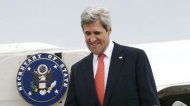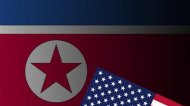Kerry to North Korea: Don't test missile
By | Associated Press – Fri, Apr 12, 2013
SEOUL, South Korea (AP) — U.S. Secretary of State John Kerrydelivered a stark warning to North Korea on Friday not to test-fire a mid-range missile, while tamping down anxiety caused by a new U.S. intelligence report suggesting significant progress in the communist regime's nuclear weapons program.
Kicking off four days of talks in an East Asia beset by increasing North Korean threats, Kerry told reporters in Seoul thatPyongyang and its enigmatic young leader would only increase their isolation if they launched the missile that American officials believe has a range of some 2,500 miles — or enough to reach the U.S. territory of Guam.
"If Kim Jong Un decides to launch a missile, whether it's across the Sea of Japan or some other direction, he will be choosing willfully to ignore the entire international community," Kerry told reporters. "And it will be a provocation and unwanted act that will raise people's temperatures."
If the trajectory of the test missile suggests that it could be a threat to either the U.S. or allies, the military would move to shoot it down from one of nine warships armed with sophisticated ballistic missile defense systems in the Pacific, including two that were moved closer to the Korean peninsula, U.S. officials said, speaking on condition of anonymity because they were not authorized to publicly discuss military plans.
Kerry said the test would be a "huge mistake" for Kim.
"It will further isolate his country and further isolate his people who are desperate for food and not missile launches," he warned. "They are desperate for opportunity and not for a leader to flex his muscles."
Kerry's diplomatic tour, while planned long in advance, is unusual in that it brings him directly to a region of escalated tensions and precisely at a time when North Korea is threatening action. The North often times its military and nuclear tests to generate maximum attention, and Kerry's presence on the peninsula alone risked spurring Pyongyang into another provocation. Another key date is the 101st birthday of the nation's founder, Kim Il Sung, on April 15.
After meeting South Korean President Park Geun-hye and Foreign Minister Yun Byung-se, Kerry also weighed in on an intelligence report that rocked Washington on Thursday, suggesting that North Korea now had the knowhow to arm a ballistic missile with a nuclear warhead — even if the weapons would lack reliability. Kerry, repeating assertions by other administration officials, noted that Pyongyang still hadn't developed or fully tested the nuclear capacities needed for such a step.
Rep. Doug Lamborn, R-Colo., surprised a hearing on the defense budget Thursday when he read aloud one paragraph of an otherwise classified Defense Intelligence Agency report. The assessment said the Pentagon's intelligence wing has "moderate confidence" that North Korea has nuclear weapons capable of delivery by ballistic missiles but that the weapon was unreliable.
The disclosure took even Gen. Martin Dempsey, chairman of the Joint Chiefs of Staff, by surprise and he refused to discuss it at the budget hearing. While analysts have made similar statements over the last two years, the reading of it at the same time Kim was renewing threats against the U.S. and its allies gave the notion new urgency.
Kerry offered strong words of solidarity for South Korea, praising Park's "bright vision" of a prosperous and reunified Korean Peninsula without nuclear weapons. By contrast, he said North Korea's Kim, by estimates only 29 or 30 years old, has a choice to make between provocation and returning to talks to de-escalate tension and lead to the end of its nuclear program.
"It's up to Kim Jong Un what he decides to do," Kerry said.
A missile launch, he said, "is not going to change our current position which is very clear: We will defend our allies. We will stand with South Korea and Japan against these threats. And we will defend ourselves."
Speaking beside Kerry, South Korea's Yun called for more United Nations action against Pyongyang if it commits another provocation.
He refused to comment specifically on the U.S. intelligence report, saying only that the North has "high nuclear and missile capabilities" but that it is still some time away from a nuclear bomb that is "small, light and diversified."
Both Yun and Kerry kept the door open for future negotiations with Pyongyang.
But both seemed to suggest that such talks were unlikely in light of the North's increasingly bombastic threats, including nuclear strikes on the United States. Most experts say those are unfeasible based on the North's current capacity and would never be explored seriously because the U.S. response would be overwhelming against a regime focused primarily on survival.
Kerry said any talks with North Korea have to lead toward denuclearization.
They have to be really serious," Kerry said. "No one is going to talk for the sake of talking and no one is going to play this round-robin game that gets repeated every few years, which is both unnecessary and dangerous."
___
Associated Press writer Lolita C. Baldor contributed to this report. yahoo news



No comments:
Post a Comment